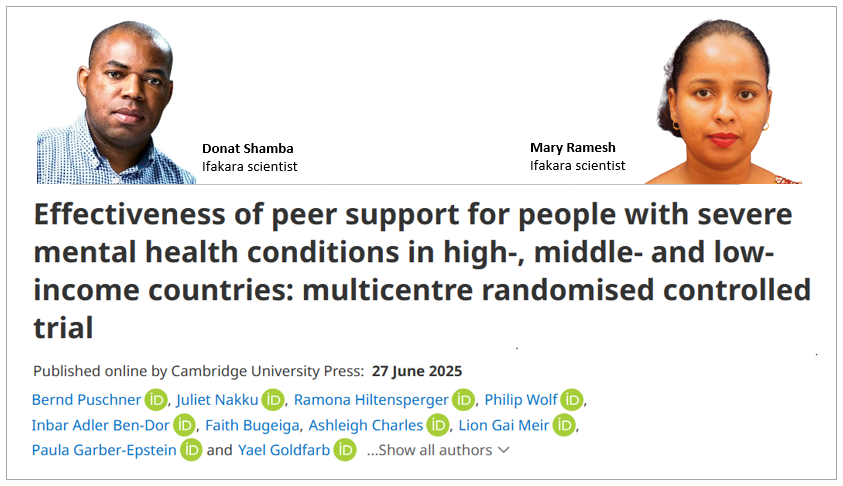
MENTAL HEALTH: Global study confirms peer support aids severe illness recovery

A global study has found that including peer support in mental health care helps people with severe mental health conditions recover better. The results show compelling evidence that support from those with lived experience can reduce loneliness and improve mental health recovery.
A landmark trial across six countries
The study, published in The British Journal of Psychiatry, is the largest randomized controlled trial of peer support for mental illness conducted to date. It evaluated the effectiveness of UPSIDES short or “Using Peer Support in Developing Empowering mental health Services” - an intervention that uses peer support in treating people with severe mental health conditions.
Over 600 participants were involved in the trial across six countries: Germany, Israel, India, Uganda, and Tanzania. It is the first large-scale study to evaluate peer support in low- and high-income settings and across multiple continents, making it a landmark in global mental health research.
Ifakara scientists among global research team
The study brought together a diverse team of 42 researchers and mental health experts from Germany, Uganda, Israel, the United Kingdom, Tanzania, and India. Among the contributors were Donat Shamba and Mary Ramesh from the Ifakara Health Institute in Tanzania. Shamba also served as the joint senior author of the publication.
How UPSIDES peer support works
UPSIDES peer support is a formal service delivered by a trained person with lived experience of recovery from a mental health condition to another person with a serious mental health condition. By sharing their experiences and offering emotional support, they help others navigate the path to recovery.
Proven benefits across contexts
The results were consistent across the six countries involved in the study, regardless of income levels. Participants who received peer support showed meaningful improvements in social inclusion, empowerment, hope, personal recovery, health, and social functioning - factors that go beyond clinical treatment.
“Peer support has beneficial impacts on social inclusion, empowerment and hope among people with severe mental health conditions across diverse settings,” noted the scientists. “As social isolation is a key driver of mental ill health, and empowerment and hope are both crucial for recovery, peer support can be recommended as an effective component of mental healthcare.”
Challenges during implementation
While the study confirmed the feasibility and effectiveness of UPSIDES peer support across varied settings, it was not without limitations. The COVID-19 pandemic disrupted timelines and led to deviations from the original study protocol, which may have slightly diluted the observed effects of the intervention. Still, the study demonstrated the ability of the UPSIDES intervention to adapt across such varied contexts, underscoring its flexibility and potential for global scale-up.
Shifting towards recovery-oriented care
The authors emphasize that these findings support a growing shift in mental health systems—away from a purely clinical model focused on medication and symptom management, toward a more holistic approach, centered on human connection and mutual experience.
“Recovery-oriented interventions are receiving increasing attention globally,” they stated. “Our trial provides strong evidence that peer support can serve as an effective component of recovery-oriented mental healthcare in diverse settings.”
Additionally, the authors note that UPSIDES is expected to inform mental health policies, implementation and practices by ensuring that the perspectives and unique contributions of people with lived experience are considered in moving mental health systems towards a recovery- and rights-based approach.
A new path forward
Ultimately, the study demonstrates that peer support can make a significant difference, regardless of where someone lives. Its success across six countries signals a need for broader adoption. As mental health remains a global priority, peer-led interventions like UPSIDES offer a practical, scalable, and human-centered solution for recovery.
Read the publication here.
